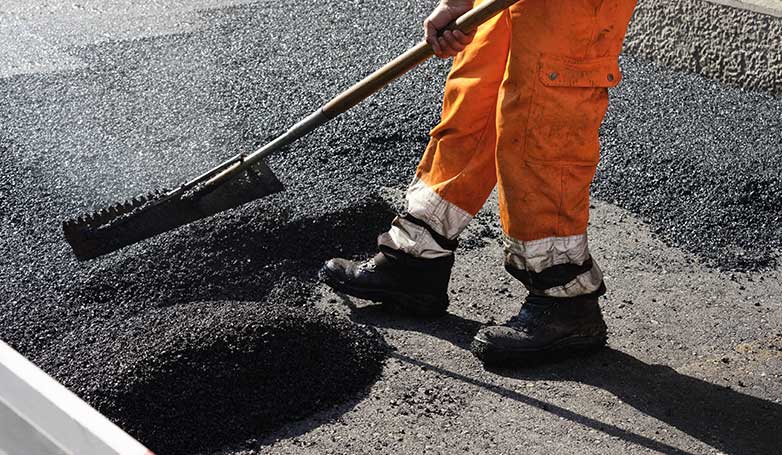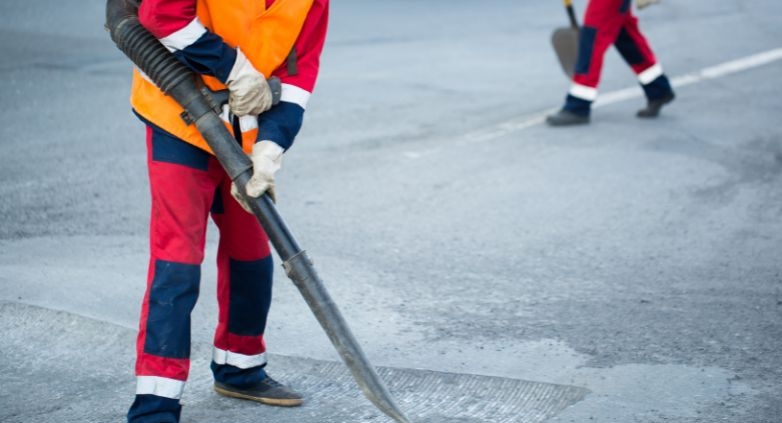Porous Surface – Best Types of Permeable Surfaces to Try Out
A porous surface allows water, vapor, or liquid to pass through. When used on paving, porous surfaces allow water to pass through, reducing the probability of standing water or puddles forming on the driveway or parking lot. But what exactly is a permeable material, and what are the common examples?
A permeable material contains pores that allow water, vapor, or liquid to seep through. The presence of pores or empty spaces allows external matter like particles, air, and water to penetrate the surface. Some common examples of porous surfaces used in paving include porous asphalt, porous pavers, permeable concrete, permeable interlocking concrete pavers, grasscrete, and porous gravel. Natural stone, turf blocks, permeable bricks, and resin-bound paving also contain permeable surfaces.
In this article, we compare porous to non-porous surfaces to help you choose the best one for your paving needs. We’ll also review some of the most popular types of porous surfaces used for paving, paying close attention to their pros, cons, and cost. Let’s get started.
What Is A Porous Surface?

A porous or permeable surface is a medium or material containing voids or pores. Porous surfaces allow water, vapor, or liquid to pass through, which makes them ideal for use in areas prone to flooding.
The presence of empty spaces and pores means external matter will penetrate the object, reducing the amount of water that accumulates after heavy downpours. Some of the main characteristics of porous surfaces include low density and large surface areas to store molecules.
What Is a Non-Porous Surface?
Non-porous surfaces are hard, rigid surfaces that don’t have pores. These materials are impervious to air and water and tend to be easier to wipe or clean compared to their porous counterparts.
Compared to porous surfaces, non-porous materials tend to be smoother. Common examples of non-porous surfaces include plastics, glass, varnished wood, and metals.
Porous Surface Vs. Non-Porous Surface
The main difference between porous and non-porous surfaces is their ability to hold air, water, or other liquids. Porous surfaces are characterized by their pores that allow things to seep or flow easily. On the other hand, non-porous surfaces have compact cell structures that prevent ease of flow.
Perhaps the main advantage of porous materials is their ability to absorb water, effectively reducing the chances of puddle formation and flooding. They tend to be rough, which makes them ideal for use on walking and driving surfaces.
However, these surfaces tend to be rough due to the pores and, therefore, difficult to clean compared to non-porous surfaces. Common examples of porous materials include drapes, untreated wood, cardboard, and carpet.
On the other hand, non-porous surfaces tend to be smoother due to their tight cell structures. They’re a lot easier to clean but tend to be slippery.
10 Types of Porous Surfaces
Keen to set up a porous paver for your driveway? If so, then you’ll need all the inspiration you can find. Let’s take a look at 10 types of porous surfaces you can use on your driveway or outdoor space.
1. Porous Asphalt
A porous asphalt driveway or parking consists of a top filter course, a porous asphalt course, a bottom filter course (optional), a reservoir course, a filter fabric, and subgrade material (or existing soil).
Using porous asphalt as a paver comes with several benefits, top of the list being improved drainage. Asphalt is also known to be durable and can have a useful life of over 20 years if properly installed and maintained.
The main challenge with porous asphalt is the high initial costs, as it’ll need special features like a stone bed. On average, you may end up spending between $8-$15 per square foot when dealing with porous asphalt.
2. Permeable Concrete
Permeable concrete, also called pervious concrete, is a porous surface commonly used in flatwork applications. It allows water to pass through, effectively reducing runoff while allowing groundwater recharge. This type of concrete is commonly used in residential streets, parking areas, driveways, and areas with light traffic.
The main advantage of permeable concrete is improved drainage due to its porous structure, which allows it to act as a natural flood management system. It is also durable if properly installed and maintained. The main disadvantages of permeable concrete are its relatively high cost ($8 to $20 per square foot) and inability to hold heavy vehicles.
3. Porous Pavers
Porous pavers are made from porous stones that allow water to seep and drain into the ground beneath. These pavers allow water to percolate through the paving into a gravel layer that acts as a filter and removes any pollutants.
Permeable pavers come with tons of advantages, such as reduced pollution, reduced local ambient temperatures, and controlled erosion. However, the main disadvantages of porous pavers are their high initial costs and inability to withstand heavy traffic. You may end up paying anywhere between $10 to $30 per square foot, depending on your preferred paver type.
4. Permeable Interlocking Concrete Pavers
Another great porous surface to try out is permeable interlocking concrete pavers, which are easy to install as they don’t require mortar. Interlocking concrete pavers that are permeable are ideal for rain-prone areas and tend to last long when properly installed.
The main disadvantage of permeable interlocking concrete pavers is that they can become easily dislodged if improperly installed. On average, you’ll pay about $4-$12 per square foot for porous interlocking concrete pavers.
5. Grasscrete
Grasscrete is a type of reinforced concrete pavement containing hollows that allow grass or other vegetation to grow. You can set up grasscrete in a variety of spaces, from driveways to patios and even walkways.
You’ll appreciate that grasscrete has a high loading capacity, is frost-resistant, UV-resistant, and slip-resistant, features that contribute to its overall durability. Disadvantages of grasscrete include installation challenges and risk of breeding insects and tiny critters. Grasscrete is generally a lot cheaper than other porous materials like concrete and asphalt.
6. Porous Gravel
Permeable gravel is an ideal porous surface for people living in flood-prone areas. The paving material is highly durable, aesthetically appealing, and easy to maintain. What’s more, porous gravel’s permeable properties make it ideal for your lawn or garden.
The main disadvantage of porous gravel is they aren’t as strong as pavements like asphalt and concrete. Proper installation is vital for porous gravel to last long and serve its purpose. On average, you’ll need to pay between $1-$3 per square foot to purchase porous gravel.
7. Turf Blocks
When looking for a porous surface that’s eco-friendly and suitable for driveways, then you need not look any further than turf blocks. Also known as grow-through pavers, turf blocks are great alternatives to traditional pavers as they’re both durable and appealing to the eye.
The main issue with turf blocks is the need for regular maintenance. You will need to mow and water the grass between the pavers and also remove weed that grows in between. On average, turf blocks can cost anywhere between $4-$20 per square foot.
8. Permeable Bricks
Porous brick is one of the best permeable surfaces to use on your outdoors. In addition to being easy to install, permeable bricks are durable and work by absorbing water until it reaches soil level. It’s among the best options if you’re looking for a pocket-friendly way to mitigate the effects of flooding on your yard.
Unfortunately, permeable bricks don’t work well on all surfaces, more specifically sloped land. They can also prove challenging to set up for people with little to no experience in paving. On average, you can expect to pay around $10 to $30 per square foot for permeable bricks.
9. Natural Stone
Natural stone is a timeless material that’s guaranteed to give your driveway or parking lot a much-needed spark. It’s relatively easy to install and readily available, while its permeability allows for improved drainage. Natural stone is also among the most durable paving materials out there and can serve you for several decades.
Unfortunately, natural stone requires a bit of care and can get slippery when wet. It’s also costlier than most paving materials, with the average cost standing at $15 – $25 per square foot, depending on the design.
10. Resin-bound Paving
Resin-bound paving is a top-quality porous surface made from mixing UV-stable resin aggregates. The porous resin performs the all-important task of filtering water that seeps through the sand base. In addition to giving your driveway a classy touch, resin-bound paving is ideal for flood prevention.
Weed growth is a common issue affecting poorly maintained resin-bound paving. Colors may also fade if you use a cheap resin that isn’t UV-stable. On average, you can expect to pay about $45 per square foot of permeable resin-bound paving.
Where to Use Porous Surfaces
Porous surfaces come with tons of benefits, especially when used as paving materials. Here are some common examples of where you can use porous surfaces.
- Driveways
- Pavements
- Parking lots
- Pedestrian routes
- Courtyards
- Garden paths
- Recreational areas
- Cycle paths
Wrapping Up
Since porous materials come in different designs, it’s advisable to choose one that best meets your preferences and budget.
The trick is to invest in high-quality porous materials and ensure they’re well-installed. While some materials are easy to install on a DIY basis, outsourcing to professionals is highly advisable if you want to minimize and eliminate the margin of error.



Leave a Reply
Want to join the discussion?Feel free to contribute!